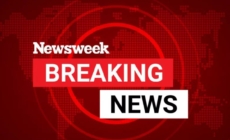-
Forced to Wait for Trump, Israel Faces Strategic Dilemma in Iran - 6 mins ago
-
How to Watch Flamengo vs Chelsea: Live Stream FIFA Club World Cup, TV Channel - 14 mins ago
-
How ICE is disrupting public health in Southern California - 45 mins ago
-
Plane Passenger Discovers Something Wrong With Luggage After Flight: ‘We Need to Be More Concerned’ - 49 mins ago
-
Repeal of Clean Energy Law Will Mean a Hotter Planet, Scientists Warn - 50 mins ago
-
Map Reveals Blackout Over US States After ‘Extreme’ Solar Flare - about 1 hour ago
-
Democrats Demand Access to ICE Office in Manhattan - 2 hours ago
-
Supreme Court Unanimously Agrees Victims Can Sue Palestinian Groups - 2 hours ago
-
As Los Angeles faces budget crisis, legal payouts skyrocket - 2 hours ago
-
Mamdani Helped a Rival Candidate. She Isn’t Returning the Favor. - 2 hours ago
Israeli and Iranian People Deserve Better | Opinion
On January 8, 2020, 176 people boarded Ukraine International Airlines Flight PS752, departing Tehran for Kyiv. Minutes after takeoff, the Islamic Revolutionary Guard Corps fired two surface-to-air missiles at the civilian airliner, killing everyone aboard.
The IRGC’s aerospace chief at the time, Amir Ali Hajizadeh, who also oversaw the regime’s missile development programme, did not apologize or resign. Nor was he dismissed. He remained in charge of a rapidly expanding arsenal of missiles and drones used by Iran and shipped to proxy forces in Yemen and Lebanon to terrorize the region.
Last week, Hajizadeh was among those killed by Israel in Operation Rising Lion — a series of pre-emptive strikes targeting Iran’s nuclear weapons infrastructure and military command.
Israelis can be grateful. So can Iranians.
Israel’s operation was not impetuous. It marked the culmination of years of intelligence gathering pointing to Tehran’s leadership approaching imminent nuclear capability as part of a mass extermination plan for the State of Israel.
While larger nations hesitated, dithered and opted for futile dialogue, Israel acted. Because it had to. Delay could have been existential. Israel could not afford to wait for a mushroom cloud to form over Tel Aviv or Jerusalem before responding.
Operation Rising Lion has disrupted and significantly scaled back Iran’s nuclear weapons development plans, crippled its missile production infrastructure, and eliminated senior military and intelligence officials, as well as nuclear scientists, who were responsible for the regime’s plans for nuclear annihilation.
While Israel’s targets have been carefully planned on targets of military value, Tehran’s strikes have been aimed at communities, schools, synagogues and hospitals across the country. Among them was Soroka Medical Center in Beersheba on Thursday, the largest hospital in southern Israel.

Photo by MAYA LEVIN/AFP via Getty Images
Israelis have not been the only victims of the Islamic Republic’s priorities.
Ordinary Iranians have been left without clean water, heating, job security or freedom of expression as Tehran has poured inordinate sums of money into assembling murderous proxies across the Middle East.
It bankrolls groups such as Hezbollah, the Houthis, and Hamas—whose October 7 massacre of Israeli civilians bore Tehran’s fingerprints.
The kidnapping of more than 250 Israeli and foreign nationals came straight from the playbook of a regime that held 50 Americans hostage for 444 days in 1979 and which has continued to engage in hostage diplomacy — as with the case of Iranian-British national Nazanin Zaghari-Ratcliffe, held on spurious charges from 2016 to 2022.
Inside Iran, the people have made their suffering — and their opposition to their callous government — clear.
Over the past 46 years, they have risen time and again, and at great cost, to resist their rulers.
Millions protested during the 2009 Green Movement against what appeared to be a rigged presidential election. Millions more took to the streets during the 2017 and 2018 economic protests.
Women and girls ripped off their hijabs in open defiance of the country’s clerical rulers following the death in police custody of Jina Mahsa Amini in late 2022. And, in the past month, truck drivers staged massive strikes to protest against abysmally low salaries and debilitating fuel hikes.
All of these acts of insurrection reveal a nation unbowed in the face of violent oppression. They are acts of national defiance against a government that values uranium enrichment and foreign militias over bread and basic human rights.
As a British Jew of Persian descent living in New York, I yearn for the day when the people of Israel and Iran can rekindle the friendship they once had.
Before the Islamic Revolution of 1979, they did. Regular direct flights once shuttled passengers from Tehran to Tel Aviv. In 1950, Iran was even the second Muslim-majority country to recognize the State of Israel. That relationship was ruptured not by the Iranian people, but stolen by a nascent theocracy that villainised Israel and the United States as the “Little” and “Great Satan.”
Today, Israel defends itself not with any animosity toward Iranians but in solidarity with them.
Operation Rising Lion is a strike not only on nuclear facilities buried deep underground and military command centers. It is also a strike against a regime that has hijacked a great nation’s future.
The Iranian people deserve better. And the world, if it values peace, stability, and human life, should thank Israel for doing what must be done.
Jonathan Harounoff is Israel’s international spokesperson to the United Nations and is the British author of “Unveiled: Inside Iran’s #WomanLifeFreedom Revolt,” out this September.
The views expressed in this article are the writer’s own.
Source link





















